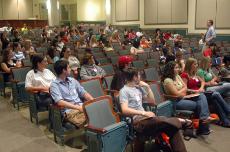You don’t have to be unknown at UI

Assistant LAS Dean Junlian Parrot introduces incoming freshmen to the graduation requirements of the college of LAS in the Gregory Hall Theater on July 7. The room is used for large lecture classes during the year. Empty seats are hard to find in the thea Beck Diefenbach
July 23, 2006
At a school as big as the University of Illinois, it is a given that many classes will be held in massive lecture halls.
Students must actively seek help if they need it; professors are not around to hold your hand.
However, the perks of large lectures should not be overlooked.
“The big lectures are very useful,” Alex Hajduk, junior in LAS, adds. “You can choose not to attend when the material becomes dry or you have a lot of experience with it already.”
Emily Vinyard, now a sophomore in LAS, actually prefers large lectures rather than smaller discussions.
Get The Daily Illini in your inbox!
“I’m not really sure why. I went to a really small high school where all the classes were like 15 people, so I like the change,” she said.
For students grappling with the material in a large lecture, it is important to connect with classmates.
“Some of my classes that are really hard, I try to talk to people around me to get help or to understand what the professor is saying,” Vinyard said.
These initial conversations could lead to a four-year study buddy.
“It’s a bit harder to get to know people in larger classes,” Hajduk said. “But if you’re lucky enough to have some high school classmates in your larger lectures, you can sit with them in a sort of safety net.”
Students who may not have that luxury can overcome the anonymity and confusion that sometimes result from the large lecture.
“You can always sit somewhere randomly and make a clever observation or comment that could spark a conversation with someone you don’t know, and who knows where that could lead,” Hajduk said.
Reaching the professor is a bit more challenging.
“Large lectures can get impersonal,” Hajduk said. “To get to know my professors, my first year in lectures I sat in the first or second row and talked with them before class, making observations and comments. Also, you can get to know them by going to their office hours and introducing yourself.”
However, many students find a gentler transition from high school to college suits them better.
“I prefer smaller classes because that way the teachers actually know who you are,” said Eugenia Ostrozhansky, freshman in Business.
Though large lectures are virtually unavoidable freshman year, there are ways to make them manageable.
Joining a learning community or forming a study group with others are ways to make classes more personal.
“As freshmen, you take lots of gen eds, which are usually two- to three-hundred person lectures, said Christine Hammer, program coordinator for the LAS learning communities.
“In learning communities, we take a small group of students from the large lecture and kind of form a smaller community of students in classes that could potentially be very large.”
Learning communities consist only of freshmen, so they all have similar fears about coming to college that connects them.
“Learning leaders” are juniors and seniors, which is “a big selling point,” Hammer said.
“I think students feel more comfortable with another student teaching,” Mercedes Ramirez-Fernandez, assistant dean of LAS, said.
“They feel less self-conscious asking questions, and it gives them a sense of comfort seeing a student who has been very successful here. It gives them someone to look up to.”
Learning community members can benefit greatly by picking the brains of their learning leader.
“The people we hire know this University from top to bottom. The learning leader has either taken the lecture or it’s in their major and they’re familiar with it,” Hammer said.
However, students should know learning communities are not a supplement to lectures, but a way to enhance the material.
“Freshmen think it’s a study hall, but learning communities are not content-based,” Hammer said.
“They are all about the university and feeling comfortable on campus. They help students learn to navigate the campus and utilize the resources available here.” u






